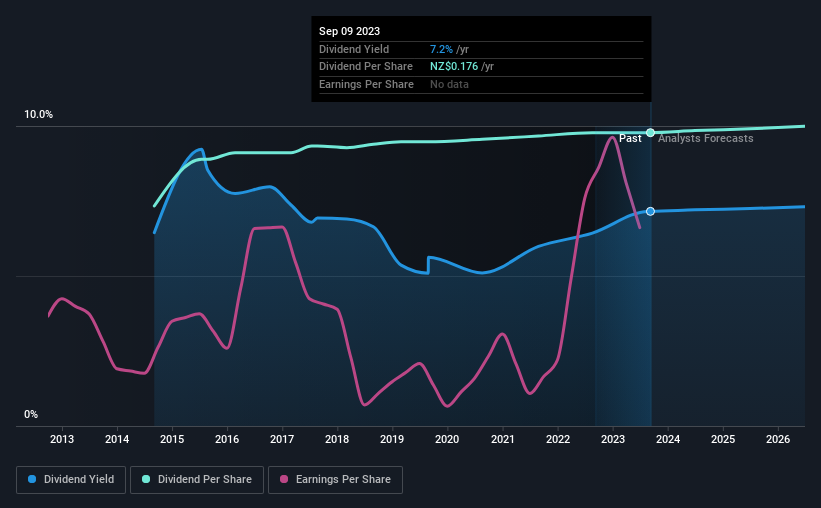- New Zealand
- /
- Electric Utilities
- /
- NZSE:GNE
Genesis Energy's (NZSE:GNE) Shareholders Will Receive A Bigger Dividend Than Last Year
Genesis Energy Limited (NZSE:GNE) has announced that it will be increasing its dividend from last year's comparable payment on the 6th of October to NZ$0.1035. This will take the dividend yield to an attractive 7.2%, providing a nice boost to shareholder returns.
View our latest analysis for Genesis Energy
Genesis Energy Doesn't Earn Enough To Cover Its Payments
A big dividend yield for a few years doesn't mean much if it can't be sustained. Before making this announcement, Genesis Energy's dividend was higher than its profits, but the free cash flows quite comfortably covered it. Healthy cash flows are always a positive sign, especially when they quite easily cover the dividend.
EPS is set to fall by 54.0% over the next 12 months. If the dividend continues along recent trends, we estimate the payout ratio could reach over 200%, which could put the dividend in jeopardy if the company's earnings don't improve.

Genesis Energy Is Still Building Its Track Record
It is great to see that Genesis Energy has been paying a stable dividend for a number of years now, however we want to be a bit cautious about whether this will remain true through a full economic cycle. The annual payment during the last 9 years was NZ$0.132 in 2014, and the most recent fiscal year payment was NZ$0.176. This implies that the company grew its distributions at a yearly rate of about 3.2% over that duration. Modest dividend growth is good to see, especially with the payments being relatively stable. However, the payment history is relatively short and we wouldn't want to rely on this dividend too much.
Dividend Growth Could Be Constrained
Investors could be attracted to the stock based on the quality of its payment history. Genesis Energy has seen EPS rising for the last five years, at 56% per annum. Strong earnings is nice to see, but unless this can be sustained on minimal reinvestment of profits, we would question whether dividends will follow suit.
Our Thoughts On Genesis Energy's Dividend
Overall, this is probably not a great income stock, even though the dividend is being raised at the moment. In the past, the payments have been unstable, but over the short term the dividend could be reliable, with the company generating enough cash to cover it. We would probably look elsewhere for an income investment.
Companies possessing a stable dividend policy will likely enjoy greater investor interest than those suffering from a more inconsistent approach. Meanwhile, despite the importance of dividend payments, they are not the only factors our readers should know when assessing a company. To that end, Genesis Energy has 3 warning signs (and 1 which is concerning) we think you should know about. Looking for more high-yielding dividend ideas? Try our collection of strong dividend payers.
New: Manage All Your Stock Portfolios in One Place
We've created the ultimate portfolio companion for stock investors, and it's free.
• Connect an unlimited number of Portfolios and see your total in one currency
• Be alerted to new Warning Signs or Risks via email or mobile
• Track the Fair Value of your stocks
Have feedback on this article? Concerned about the content? Get in touch with us directly. Alternatively, email editorial-team (at) simplywallst.com.
This article by Simply Wall St is general in nature. We provide commentary based on historical data and analyst forecasts only using an unbiased methodology and our articles are not intended to be financial advice. It does not constitute a recommendation to buy or sell any stock, and does not take account of your objectives, or your financial situation. We aim to bring you long-term focused analysis driven by fundamental data. Note that our analysis may not factor in the latest price-sensitive company announcements or qualitative material. Simply Wall St has no position in any stocks mentioned.
About NZSE:GNE
Genesis Energy
Generates, trades in, and sells electricity to residential and business customers in New Zealand.
Solid track record and good value.
Similar Companies
Market Insights
Weekly Picks


Crazy Undervalued 42 Baggers Silver Play (Active & Running Mine)


Fiducian: Compliance Clouds or Value Opportunity?

Willamette Valley Vineyards (WVVI): Not-So-Great Value
Recently Updated Narratives

Watch Pulse Seismic Outperform with 13.6% Revenue Growth in the Coming Years

Significantly undervalued gold explorer in Timmins, finally getting traction

Moderation and Stabilisation: HOLD: Fair Price based on a 4-year Cycle is $12.08
Popular Narratives


MicroVision will explode future revenue by 380.37% with a vision towards success


NVDA: Expanding AI Demand Will Drive Major Data Center Investments Through 2026





